Peter MALONE
Saturday, 18 September 2021 20:00
Maggie
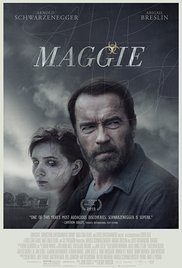
MAGGIE
US, 2014, 95 minutes, Colour.
Arnold Schwarzenegger, Abigail Breslin, Joely Richardson, Douglas M.Griffin, J.D.Evermore, Rachel Whitman Groves, Jodie Moore, Bryce Romero.
Directed by Henry Hobson.
Arnold Schwarzenegger in a zombie film? And Abigail Breslin playing a zombie?
While this is a film about the living dead, it is more of a film about family, a domestic zombie film with less emphasis on the horror. Schwarzenegger plays a family man at a time when there is plague, victims are infectious, there is a repercussions on society, destroying crops and taking any means to survive.
Abigail Breslin, playing something of an ordinary schoolgirl, has been infected and is gradually being transformed, her father trying to persuade the authorities against taking her, concealing the infection, sending his wife, Joely Richardson, and their other child away for safety.
There are some scenes when children gather together, just like an ordinary teen film, but there is another boy who has been transformed and there is a growing danger for the other children.
Maggie, realising what is happening to her, is tempted to infect her father but resists, finally going to a roof and accepting her fate.
Although it will appeal mainly to those who are interested in stories of the living dead, it is different from the usual and hence may have an appeal more widely.
1. A film of family? Of illness? Threats, death?
2. A zombie film, the living dead, the plague, the repercussions?
3. A domestic zombie film with the emphasis less on horror and more on family and relationships and coping?
4. The film as a vehicle for Arnold Schwarzenegger? The more serious role? The strong performance? The strong man, older, his appearance, the stubbled beard, his gait, the use of his strength, the police, a patriarch and concerned about his family?
5. The situation, the introduction, media explanations, the burning of the crops? Plague, contracted by a bite, infectious? The burning of the crops? The consequences for ordinary life, families hiding victims, the police coming to take them for quarantine and their deaths? School classes and diminishment? The medical centres? The fear of the populace?
6. Maggie, seen walking, hoodie, in the streets, the victims, the police, her being taken to the hospital, the tests? The father searching for her?
7. Wade, taking Maggie home, fatherly concern, the limits of time before her death? The death of his wife, happy memories, his marrying again, Caroline, her two children, their going to stay with their aunt, the boy and his conversation on the roof with Maggie, aware of the realities?
8. Life at home, the meals, the doctor explaining the symptoms, loss of appetite? Maggie and the bites on her arm, scratching, needing bandaging? Going to see the doctor for a progress examination, some strengths, but the doctor warning Wade, his talking of choices, going to the quarantine centre, having the medication that the quarantine had for deaths, shooting? His recommendation about shooting?
9. In the house, the jokes about the meal, Maggie cutting her finger, cutting it off, getting rid of the finger, cleaning up the contaminated blood, her going into the woods, the experience with the fox, its being caught, her insatiable hunger? With Caroline and the sense of smell, thinking her father was cooking? Caroline knowing it was time, loving Maggie, but leaving for the other children?
10. Nicky, his friends, uncles dressing, going out, the dancing, the friendship, enjoyment, the ball without infection and his talk? The infected boy? Maggie’s concern for him? Her going to his house, his locking the door, the police arriving, smashing down the door, the father with the gun, his being taken away to quarantine?
11. Wade, his encounter with the neighbours in the woods, their being zombies, the threats, his killing them both? The police, taking the wife, her confronting Wade with the gun, wanting to see her husband and daughter, going with the police?
12. Wade, the police, his fight with them, the reassurance that all was well with Maggie?
13. Maggie, her dreams and memories, knowing that she was close to death, her father taking her to see the garden of daisies, memories of her mother, her love for daisies?
14. Wade, sleep, Maggie tempted to bite him, resisting, going to the roof, standing, remembering her mother, her mother beckoning her, her falling?
15. Audience and awareness of the zombie genre, the many variations – but this one utilising some of the conventions but doing a family illness drama?
Published in Movie Reviews
Published in
Movie Reviews
Tagged under
Saturday, 18 September 2021 20:00
Tangerine
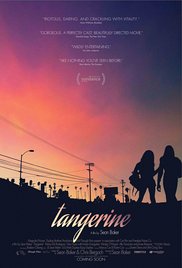
TANGERINE
US, 2015, 88 minutes, Colour.
Katana Kiki Rodriguez, Mya Taylor, Karren Karagulian, Mickey O' Hagan, James Ransone, Alla Tumanian.
Direction by Sean Baker.
Tangerine became famous because it was filmed on three iPhones – which has amazed some audiences because of the quality of the photography.
The film was also won quite a number of awards ranging from Cork to Deauville, from Karlovy Vary to Mar del Plata to Rio de Janeiro as well as American awards.
It takes us into a world most audiences are not familiar with, the world of prostitutes and pimps in Los Angeles, focusing on transgender characters, two of them played by transgender actors. They are friends. One goes in search of the pimp whom she felt has betrayed her, eventually catching up, a falling out between the two men confronting the woman he is now with, and their plotting together.
Often rough and ready in tone and character as well is in plot developments, it was well received with something of a cult status, of a number of lists amongst the best films of 2015. Its writer-director, Sean Baker, had made an impact with his feature film, Starlet.
1. Acclaim for the film, the camera photography, the editing? A successful experimental films?
2. Los Angeles settings, the street, the prostitutes and their patches, the cars and the customers, taxi drivers, the police, cafes, bars, venues for the singing gigs, the atmosphere? The musical score? Songs?
3. The action taking place over only a couple of hours? The Christmas Eve setting and how it was used?
4. The world of transsexuals, transgender? The African- Americans? The whites? Prostitution, pimps? The importance of dress, fashion, make up? Antagonisms? Friends? Emotions, jealousies?
5. Life in the raw, vulgar, chaotic?
6. The meeting of Sin- Dee and Alexandra? Their personalities? As individuals, gender issues? Prostitution and customers? Pimps? Emotions? Alexandra and the handouts for her gig? Continuing to hand them out to everybody in the street, associates, friends – and so very few turning up?
7. Sin- Dee, being away, her return, her looking for Chester? Chatting with Alexandra, Alexandra letting the information slip, Chester and his infidelity? The repercussions for Sin- Dee? Spending the rest of the film trying to find out who the girl was, the name starting with D, asking everybody, pimps, friends? Eventually tracking down Dinah, the brothel, the madame, the clients, their reactions, the prostitutes, Sin- Dee dragging Dinah out, dragging her through the streets, the attack? Eventually finding Chester? Confronting him? Cindy and her remembering Alexandra, the gig, in the bus, dragging Dinah to the gig? Her hearty applause?
8. Alexandra, meeting your friends, concern about the gig, with the taxi driver, arriving at the venue, the manager, nobody there? Performance? Responses?
9. The taxi driver, his clients, Armenian background, going home to his family, his wife, children, the extended family and the meal, his going out? The Donut cafe, the family, the mother-in-law and her comments? The wife and her husband going out on Christmas Eve? The variety of clients, the men vomiting in his taxi and his reaction? The encounter with Sin- Dee? Sexual dissatisfaction, throwing her out? His friendship with Alexandra? Sexual satisfaction?
10. Sin- Dee, the fight, the police, the policewoman and her mediation?
11. The range of characters, in this atmosphere of Los Angeles?
12. Audience interest in central characters, their lives, their issues? Empathy for them?
13. The success of the experiment, the phone cameras, the techniques used, the locations, for movement, the close-ups, the gig?
Published in Movie Reviews
Published in
Movie Reviews
Tagged under
Saturday, 18 September 2021 20:00
I Stand Alone/ Seul contre tous
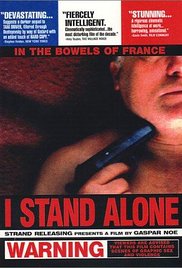
I STAND ALONE/ SEUL CONTRE TOUS
France, 1998, 93 minutes, Colour.
Philippe Nahon, Blandine Lenoir, Frankie Pain, Martine Audrain.
Directed by Gaspar Noe.
I Stand Alone was the first feature film from Argentinian-born director, Gaspar Noe; his films were made in France. After several short films, including Carne, which featured the character of the butcher from this film and the same actor, this was his first full-length film. He was to go on to make a number of short films, segments of feature films and controversial films, Irreversible about rape, Enter The Void, set in Japan and nihilistic in its perspective and the very explicit, filmed in 3D, Love.
This film is about a brutal man. The style of filmmaking is frequently brutal – and it is a brutal assault on the sensibilities of the audience. The film received great acclaim because of its style, its sombre subject and its consistency in presenting the portrait of an angry man, reaching middle age, frustrated, poor in relationships, sexually active but harsh towards women, violent and experiencing prison (and a sexual experience with a cell mate, though he is homophobic), finding that he cannot be employed, that he cannot take up his profession as a butcher of horse meat, finally angry with the owner of an abattoir and others who have humiliated him, plans to kill them – and, in his descent into madness, allowing previous incestuous feelings towards his daughter to surface.
Philippe Nahon gives a powerful performance as the butcher, with a great deal of monologue intensity.
Noe is a distinctive director – but a hard filmmaker for most audiences.
1. The impact of the film? Hard and harsh? Audience sensibility and sensitivity?
2. The work of the director, Argentinian-born, working in France, his short films, the predecessor to this feature, Carne, his directness, in matters of violence and sexuality, impact on the emotions?
3. French film at the end of the 20th century, the perspective on 1980, French society, French characters, universal application?
4. An ugly film, the locations, homes, the butcher’s shop, the nursing home, prison, the warehouse, the abattoir, the bar, the asylum? Musical score?
5. The detail of the portrait of the butcher, aged 50, his appearance, his narrative voice over, the intensity of his continued monologues?
6. The butcher, an Everyman character, his angers, an initial victim, his madness, as an orphan, clerical abuse, lack of opportunities, no education, his becoming a butcher – and the popularity and reputation of horse meat? His shop, the pregnant girlfriend, the birth of his daughter, the woman abandoning them because she wanted a son? Caring for his daughter over the years, the blood, assuming that the man had raped his daughter, not recognising menstruation, stabbing the man? Arrested, court, going to prison, life in prison, the cellmate, the sexual encounter? Selling his shop to a Muslim? His daughter, mental retardation, going into the institution? Getting out, the bar, his work, the owner, her promise of a shop, moving north, her not fulfilling the promise? Getting a job as a watchman? The nursing home, the nurse, witnessing the death? His anger at his mistress, punching her, a miscarriage? Returning to Paris, rejected from jobs, seeking advice from acquaintances, not getting a job in the abattoir, the decision to murder the owner, in the bar, the gun, the bullets, his intended targets of those who had humiliated him? With his daughter, the incestuous feelings, his justification?
7. The women in the film, the perspective on women, the initial girlfriend, pregnant, walking away from the butcher and the daughter? The mistress, older, owning the bar, the promise of the shop, moving, her pregnancy, the butcher’s anger, punching her, miscarriage? The relationship with the nurse at the nursing home?
8. The daughter, her upbringing, her mental condition, in the institution, returning home, the object of her father’s feelings?
9. The butcher’s lack of relationships, consulting friends who shun him, the shop and the customers, the prison, his victims?
10. A critique of French society, poverty, lack of education? A film of angers, prejudices, homophobia – and destruction?
Published in Movie Reviews
Published in
Movie Reviews
Tagged under
Saturday, 18 September 2021 20:00
Only the Dead
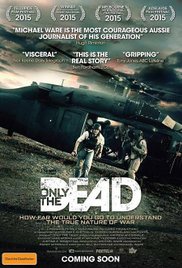
ONLY THE DEAD
Australia, 2015, 75 minutes, Colour.
Directed by Bill Guttentag and Michael Ware.
Produced and released in the context of IS in 2015, this film has an added dimension to its portrayal of events and warfare in Iraq, 2003 to 2007.
In some ways, what is seen on the screen is quite familiar to movie audiences who have looked at films about the Iraq war, including Paul Haggis’ In the Valley of Elah, Brian de Palma’s Rendition and, especially, Clint Eastwood’s American Sniper. In fact, the detailed movie recreations of warfare, the portrait of the soldiers, especially the snipers, and the picture of Iraqi insurgents as well as of ordinary people, have brought home a lot of the realities of war visually and aurally.
Which enhances watching Only The Dead in the light of these movies. This is the real thing.
Michael Ware, an Australian (and Screen Australia and Screen Queensland have contributed to this production), a journalist for Time Magazine, eager to be out in the field, chasing stories which gave him energy as well his reputation, was in Iraq just before the coalition invasion. He introduces himself, his background, his journalistic work, his camera continually with him, as well as his Russian colleague, Rudy, and the number of locals who helped the journalists in the Time office – and some regrets that the death of some of them.
He is near the Iraqi border in 2003, is with soldiers, experiences bombardments, and hears the news of the coalition attack. There are visuals of the bombing of Baghdad as well as speeches by President Bush.
In the aftermath of the attack, Michael Ware experiences brutality, roadside bombs and their consequences, which changes his perspective. He continues to accompany American soldiers in the field, filming them in action, shooting and explosions, woundings (including the word terrorist who takes a long time to die, many spasms until his expiring, their killings, as well as their views on patriotism to camera, the hardening of their attitudes towards the enemy.
But, he is approached by followers of the Jordanian-born terrorist, Al- Zarqawi, who was fomenting civil unrest, Civil War and insurgent uprisings in the immediate aftermath of the invasion.Michael Ware was brought into camps, met and filmed a number of the insurgents, recorded their attitudes, their patriotism, their anti-Americanism.
Al-Zaqawi? became one of the America’s most wanted, and Michael Ware served something of a pipeline between sides, puzzled why he was chosen, prepared to go into very risky situations, documenting the attacks and gruesome car bombings which began to increase.
His footage also shows many of the locals, some of whom were armed and possible terrorists, others who were caught in difficult circumstances, others who helped, and others who experienced devastation while innocent.
Towards the end of the film, a bombing raid, two heavy bombs, killed Al- Zarqawi – and he includes footage of television news programs from around the world announcing the death, including a triumphant George Bush.
While Michael Ware was to continue for some years working in Iraq, it was only much later that he assembled his footage, 300 hours taken over the years and decided that there was a story to tell, a story which highlighted in retrospect what happened during those years, and edited the material and wrote a narrative which he delivers.
The film won Australian Film Institute awards for editing, sound, direction.
On the one hand, the Hollywood movies have been able to recreate the battles in Iraq and this has made an impact – but, as we watch this film, sometimes with some horror, this is a record of the real thing, of actual events, warfare, deaths.
Published in Movie Reviews
Published in
Movie Reviews
Tagged under
Saturday, 18 September 2021 20:00
Price We Pay, The
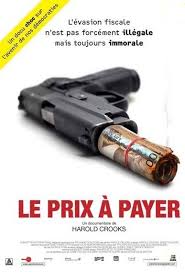
THE PRICE WE PAY
Canada, 2014, 93 minutes, Colour.
Directed by Harold Crooks.
This is a documentary on the history and present-day reality of big-business tax avoidance, which has seen multinationals depriving governments of trillions of dollars in tax revenues by harboring profits in offshore havens.
Gives a number of examples of companies which operate in this way as well as detailing the countries who offer these safe havens.
The film makes the distinction between tax avoidance and tax evasion. The former tries to work within legal prescriptions – though, not necessarily, moral prescriptions – while the latter is criminal behaviour.
The film is based on a book by Brigitte Alepin, La Crise fiscale que vient.
From the website for the film: “A documentary about the dark history and dire present-day reality of big-business tax avoidance, which has seen multinationals depriving governments of trillions of dollars in tax revenues by harboring profits in offshore havens. Tax havens, originally created by London bankers in the 50s, today put over half the world’s stock of money beyond reach of public treasuries.
Nation states are being reshaped by this offshoring of the world’s wealth. Tax avoidance by big corporations and the wealthy – citizens of nowhere for tax purposes – is paving the way to historic levels of inequality and placing the tax burden on the middle class and the poor. Crusading journalists, tax justice campaigners and former finance and technology industry insiders speak frankly about the accelerating trends that are carrying the Western world to an unsustainable future.”
The material of the film is quite disturbing, especially in the light of later revelations, especially the so-called Panama Papers of 2016.
However, the film has a limited emotional impact with its constant succession of talking heads, making the film more like a lecture rather than a cinema experience.
Published in Movie Reviews
Published in
Movie Reviews
Tagged under
Saturday, 18 September 2021 20:00
Serial, Bad, Weddings/ Qu'est-ce qu'on a fait au bon dieu
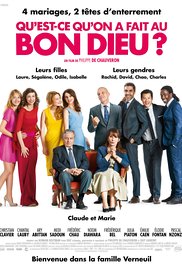
SERIAL (BAD) WEDDINGS/ Qu’est-ce qu’on a fait au Bon Dieu/ What on earth have we done to the Good Lord.
France, 2013, 97 minutes, Colour.
Christian Clavier, Chantal Lauby, Ary Abitan, Medi Sadoun, Frederic Chau, Noom Diawara, Julia Piaton, Frederique Bel, Emily Caen, Elodie Fontan, Pascal N' Zonzi, Salimata Kamate, Tatiana Rojo, Loic Legendre.
Directed by Philippe de Chauveron.
Serial (Bad) Weddings may be a title to entice audiences in, especially if they have attitudes towards weddings and want to see what bad weddings look like. This title translation has no bearing on the original French title which translates something like, What on earth have we done to the Good Lord!
There are serial weddings in this screenplay, the central Catholic couple, living in a provincial French town, have four daughters of marriageable age. At the opening of the film, one of the daughters marries a Muslim, the ceremony taking place in the Town Hall, the parents, especially the father, not at all comfortable in the marriage outside the church, let alone to a Muslim. We sense the prejudices, the intolerance!
Months later, we are back in the Town Hall for the second wedding and, we might have guessed, the next daughter marries a Jewish husband. The parents are getting more tense, the father less tolerant, although he tries to put on an agreeable front.
And then… Back in the Town Hall, with the third daughter marrying a Chinese. This, of course, brings a different range of prejudices and another strain on tolerance.
Part of the comedy of the film is the interaction between the three sons-in-law, who also have plenty to disagree about and who have their own levels of intolerance. The Muslim husband is a lawyer, the Jewish husband is a man with brainwaves for inventions and schemes, the Chinese is a banker who is not necessarily able to finance the schemes. The humorous dialogue has quite a deal about the different characteristics of each of the men, especially with jokes about Chinese food and Chinese excess of punctuality.
The film is an amusing, satirically observed presentation of traditionalist French families and the inroads of contemporary migration, ethnic variety, multicultural life in France.
And the fourth daughter? We see that she is living in Paris with someone who is seen reading and who, when he removes the book from in front of him, is black, from the Ivory Coast. The only consolation is that he is a Catholic and that the wedding could take place in the church. But, shock when the parents meet the prospective son-in-law, who is an actor, with the three prospective brothers-in-law scheming to expose him as a two-timer (only to discover that he is escorting his sister back to the apartment).
Matters are not so happy in the Ivory Coast as we see the mirror-image of prejudice and intolerance and reaction against French colonial domination. There is also a young priest in the town, an amusing if satirical confession sequence where he has heard it all before from the mother of the brides and is busy on his I-pad, searching out bargains. He has some other scenes, especially talking with the two mothers and laughing at the situation, presiding over midnight mass which they will attend, a touch of the camp, but doing the ceremony and really enjoying the dancing at the reception.
If you want a French perspective on contemporary migration issues, ethnic differences, multicultural values, traditional French values in the church, then this is the film to see.
1. The title, the plot, themes?
2. The French style, Porter families, clashes, meals and gatherings?
3. The city of chin on, homes, the countryside, restaurants, church, scenes in Paris, theatre? The African sequences in Ivory Coast? The towns, airport, families, homes? The musical score?
4. The joy of weddings, and the final climax?
5. The introduction to the three weddings, the Arab wedding, the Jewish wedding, the Chinese wedding? Race issues? The families and their applause? The parents, the fathers trying to green and buried? In the Registry office? Time passing, going to the bar mitzvah, the synagogue, the comments about the circumcision, the cutting, the gift, bearing it in the garden, the dog?
6. The grandchildren coming, the grandparents and part of the change of heart?
7. Race issues: Arabs and friends, Algerian backgrounds? The place of the Jews in France and their traditions, business? The place of the Chinese, business success, actuality? The different kinds of foods and restrictions? The different cultures? Religious backgrounds? Not being strict? The parents and their attitudes, having to be tolerant, trying to cope but not approving? The families amongst themselves, the sons-in-law and their clashes? No black presence?
8. The jobs, the Chinese man in the bank and the loans, the Arab in the courts, the Jewish man and his ideas, bio-cosh? The jokes and the slurs?
9. The characters, the wives, the success of the marriages? The work of the wives, the highly sensitive artist and her paintings, the exhibition, the picture and her parents home – and their putting it in the attic and it falling on the father? The reaction of the daughter fearing that they had sold it? The
10. the meal, the restaurant, the tensions, the parents walking out, driving home, aggravating their prejudices?
11. The idea of inviting all the families for Christmas, to chin on? The various reactions, jokes, the role agreeing? The arrival? They’re all time trying? The mother and her buying three different turkeys, the different cookings – and each of the men tasting the other Turkey? The meal and the sharing? After the meal, the multicultural snowman, the snowball fight? Going to midnight mass, their hearty singing of the hymn of the Divine Infant? The morning after and the gifts?
12. Laura, Charles, the revelation that he was black? The secrecy? His going to Africa, at the airport, his stern father, his loving mother, the sister? The discussions at home, the threats from the father? At the restaurant, Laura’s parents arriving, coping? The discussions about Charles, his work as a clown, acting? The three brothers-in-law and wanting to get rid of him, going to the theatre, his performing French comedy, feed oh? Their thoughts about him and the actress? Singing with his sister, the photographs – and their being exposed? The importance of the Skype discussions between the two families, the prejudices surfacing, the payments, the style of the wedding, the food? Charles father and his military background? Feeling that he lost promotion?
13. The arrival, bigotry on both sides with the fathers, giving up the bedroom? The mother, her depression, going to the psychiatrist, her husband not sympathetic, his lawyers work, their discussions?
14. The three days before the wedding, the buildup, interactions, prejudices? The effect on Charles and Laura?
15. The father going fishing, Charles father going with him, pulling in the big fish, the fish biting Charles father’s hand, the blood on the handkerchief? The going to the restaurant, drinking, becoming good friends, finding what they had in common? Changing clothes? Causing an upset, the issue of the desert and the Negro’s Head? The police, the arrest, in jail? The turning against the men with white hair?
16. The family, the concern, discovery of the truth, the father is coming back?
17. Laura, feeling bad, the parents and the impending divorce, the father planning to sell the house and travel, the wife and her leaving? In culture rate and, the African dancing and training?
18. The relieving, Charles at the station, the fathers arriving, getting on the train, travelling, the African man pretending to have an attack, stopping the train?
19. Everybody waiting at the church, getting to the church on time, the happiness of the celebration?
20. The issue of Catholicism, the parents and the traditional beliefs, wanting catholic marriages, tolerating other marriages? The mother and the priest, in the confessional, his lack of interest, his iPad and work, later visiting the church, his laughing at the prospect of yet another different race son-in-law, celebration of the ceremony, his beaker with the dancing?
21. The speeches, concessions, and happiness all-round?
22. The value of this kind of film in enabling people to stand in other people’s shoes and understand, and appreciate? The breaking down of racism and hostility?
Published in Movie Reviews
Published in
Movie Reviews
Tagged under
Saturday, 18 September 2021 20:00
Major League: Back to the Minors
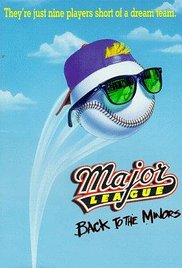
MAJOR LEAGUE: BACK TO THE MINORS
US, 1998, 100 minutes, Colour.
Scott Bakula, Corbin Bernsen, Dennis Hayesbert, Takaaki Ishibashi, Jensen Daggett, Walton Goggins, Ted Mc Ginley.
Directed by John Warren.
The title can be taken literally. While the screenplay, by the director, John Warren, takes up characters created by David S. Ward for his successful film, Major League, this film has very little to do with the original and its sequel.
It is a film for an American audience and for those who love baseball. It is also a variation on the coach who falls on hard times, is persuaded to go back to a minor team, coach them against unlikely odds, the taunts of rivals, his own self image, and then a final confrontational match which, of course, they win.
The characters are more or less as to be expected. Scott Bakula is seen playing but using a frozen ball and so is sent off the field. He is approached by a manager friend, played by Corbin Bernsen, to take over a team which seems to have little prospect but has a lot of talent. Much of the film is taken up with the coach, the variety of characters, multicultural, in the group, and the details of their training. There is a particular focus on a young player who has talent but needs training, played by Walton Goggins (who was to have a successful career as a character actor in many prominent films but was most effective as one of Quentin Tarantino’s The Hateful Eight).
There is a touch of romance with the coach and his girlfriend, played by Jensen Daggett.
There is some comedy with the commentators in the box and some broad comedy in the clash between the coach and a presumptuous and foolish rival played by Ted Mc Ginley.
The film is more or less a time-passer but is certainly geared to an American baseball-loving audience.
Published in Movie Reviews
Published in
Movie Reviews
Tagged under
Saturday, 18 September 2021 20:00
White Shadows in the South Seas
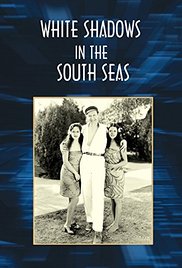
WHITE SHADOWS IN THE SOUTH SEAS
US, 1928, 88 minutes, Black and white and tints.
Monte Blue, Raquel Torres, Robert Anderson.
Under the supervision of W.S.Van Dyke and Robert Flaherty.
Robert Flaherty was a celebrated documentary filmmaker and had explored the Arctic in Nanook of the North and the Pacific in Moana. He collaborated here with prolific in MGM director, W.S. Van Dyke who had begun his career in 1917 in silent films and was to continue into the 1930s, directing all kind of genre films at MGM, dying in 1943. He also directed the MGM feature film set in the Arctic, Eskimo.
The film has a blend of silent footage and sound footage, filmed in black and white and many of the sequences tinted for release.
The company went on location into the Pacific, the islands of the Marquesas. The location photography is quite striking, highlighting the look of the islands, the presence of the indigenous people, some who had been influenced by white colonialism and others who had lived separated from the whites. There is quite some detail of the locals diving for pearls, their skills, the physical toll of the work, the exploitation by the white bosses.
The central character is an American doctor, Monte Blue, something of a derelict as he is called, living in the islands, becoming disillusioned, clashing with one of the pearl bosses, Sebastian, played by Robert Anderson. He is taken by the thugs and put on a boat, steered into shark waters, but the doctor gets control of the boat and lands on a remote island. He is welcome by the local people and finds himself at home. These lyrical sequences indicate the romantic attitudes towards South Sea people at the times.
All would have been well except for human nature… There is pearl diving at the remote island, the doctor becoming interested in the pearls, his greed overcoming some of his decency, his setting up a beacon to signal in case a ship should pass by. The ship that does come is under the command of Sebastian. There is a clash – resulting in the death of the doctor.
Very much a film of the 1920s in its characterisation and story, but an opportunity for some ethnographic study and observing of the Pacific islands in the 1920s.
Published in Movie Reviews
Published in
Movie Reviews
Tagged under
Saturday, 18 September 2021 20:00
Never Back Down
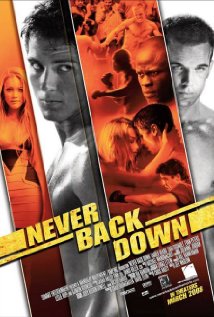
NEVER BACK DOWN
US, 2008, 110 minutes, Colour.
Sean Faris, Amber Heard, Cam Gigandet, Evan Peters, Leslie Hope, Djimon Hounsou.
Directed by Jeff Wadlow.
Never Back Down has a target audience of middle teenage boys – with an appeal to boys of an older age as well.
Sean Faris, who appeared in some action films as well as parody films requiring a muscleman, is a boy who moves with his family to a new neighbourhood, has to settle into a school, is attracted by one of the glamorous students, played by Amber Heard, but falls foul of the martial arts champion, played by Cam Gigandet.
At home, there are some tensions, especially with his father who is involved, drunk, in a car accident.
In the meantime, having been defeated in a fight, he seeks out a trainer, who has a sad background and a rather grim manner, Djimon Hounsou, and, the final fight is in little doubt, except when the young man has an injury but perseveres, even to the admiration of his adversary.
There are echoes of Fight Club and mentoring films like The Karate Kid a kind of high school shirtless and bikini Baywatch. The film was directed by Jeff Wadlow who directed the second Kick Ass film – and this is a teenage Kick Ass film.
1. Teen drama? High school, fights, romances, parents, training, growing up?
2. The title, martial arts, echoes of Fight Club, of The Karate Kid…?
3. The locations, the American town, homes, roads, bars, school? The musical score?
4. The emphasis on martial arts, the choreography of the fights, the training, the role of the mentor?
5. Jake, his age, relationship with his father, mother, family, moving to the new neighbourhood, his unease? Setting up the house, his relationship with his father, drinking, accompanying him, the accident, death? Coping?
6. Going to school, meeting Ryan Mc Carthy, taunts, fights, Mc Carthy as champion for two years, training and fitness? Jake, his abilities? Being beaten? Going to the mentor? The initial clash? The training, the regimen, the buildup to the fights? The climax, the injury, Jake continuing on – and some admiration from Mc Carthy?
7. The mentor, his personality, his back story, sadness, in America, his work, relationship with Jake, the training?
8. The romantic element, the popular girl, relationship with Ryan Mc Carthy, her response to Jake, clashes, fights, reconciliation?
9. The final fight, the drama, the effect on Jake, responsibility, maturity? His future?
Published in Movie Reviews
Published in
Movie Reviews
Tagged under
Saturday, 18 September 2021 20:00
Song of Songs/ Ukraine 2015
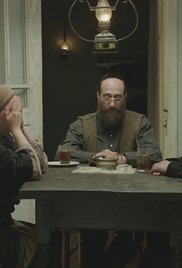
SONG OF SONGS
Ukraine, 2015, 74 minutes, Colour.
Directed by Eva Neymann.
Song of Songs is a brief poetic film, based on the stories of Sholem Aleichem, of life in a Ukrainian Shtetl in 1905. It is still a very old-worldly atmosphere, although there is a brief comic sequence with a group of musicians posing for a photo and an old-fashioned camera and photographer.
In the first half of the film, there is a visual attention to the life, the homes, the streets, the occupations, the schools, the religious men, the pious Jewish atmosphere. In the latter part of the film, the focus is on two young people whom we have seen together when there were children, the boy thinking that he was a Prince and the girl was a Princess and that they would go far away. In their growing up, they play with each other, have a great affection for each other – but there is the caution that it is not appropriate according to the law for them to touch.
In the second part of the film, the boy has grown up, gone away to study, returns to the Shtetl, quite impressive in his appearance and manner, yet very serious, because the young woman is betrothed to someone else. They meet. There is a bond between them but a quiet frustration for the young man that they can never marry. In the final part of the film, they go at into the woods, a beautifully sunny day, attractive photography, the lyrical atmosphere as the audience watches the two, contemplates their love, and the dialogue draws on the biblical book of the Song of Songs, some of the Biblical text, references to the text – especially in the sensual images which are poetic expressions of the glory of human love.
The film was awarded an Ecumenical Commendation at the Czech Festival in Karlovy Vary, 2015.
1. The audience for this film, Jewish audience, Ukraine, universal?
2. The title, the biblical reference, the use of the text, expanding on the central idea of the text? Its spirituality?
3. Ukraine, the end of the 19th century, life in the Shtetl, the homes, interiors, poor, the yard? The walk along the streets, the pavement, the gutters? The range of people? The photographer and his long posing of the musicians, the carrier wanting to get into the photo? The religious men, prayer? The school, the obese teacher? Studying Genesis? Shimek and the buttons?
4. Shimek, his age, his voice-over, at home, dressing, his mother blowing his nose, going to school, stepping in the puddle, at school, on the bench, his behaviour, answering the questions, not sure of the answers, the buttons?
5. The detail of the household, the detail of the Shtetl, the father, having the letter read to him, the mother, the washing and her duties at home? Their personalities?
6. Shimek, his comment that he and Buzya were Prince and Princess, the plan, to go away together? The playing together, the attraction, talking? Buzya and background, her story, her personality, age?
7. Growing up, sharing together, the comment about brother and sister, love, the ritual not allowing them to touch? The lyrical scenes in the woods?
8. Growing up, Shimek going away, his return, his studies, appearance, needs young man and his clothes, with the family? The adult Buzya, her presence, engaged? Meeting the family? Shimek and his sadness, his continued love for Buzya?
9. The picture of the groups and family, posing, the response to this situation, the wedding?
10. The long sequences of Shimek and Buzya together, the language of the Song of Songs, the Biblical tone, the text, the lyrical images? The beauty of the photography and the woods? Symbolising the love between the two?
Published in Movie Reviews
Published in
Movie Reviews
Tagged under